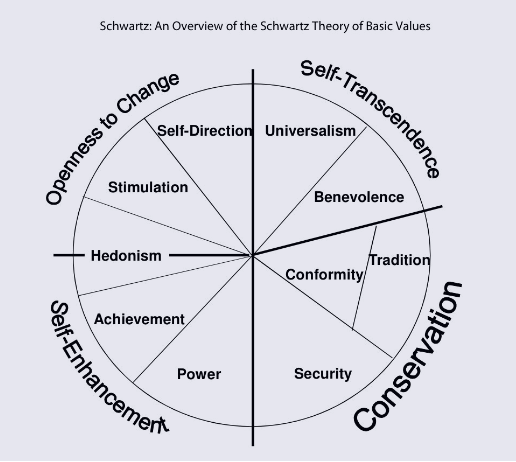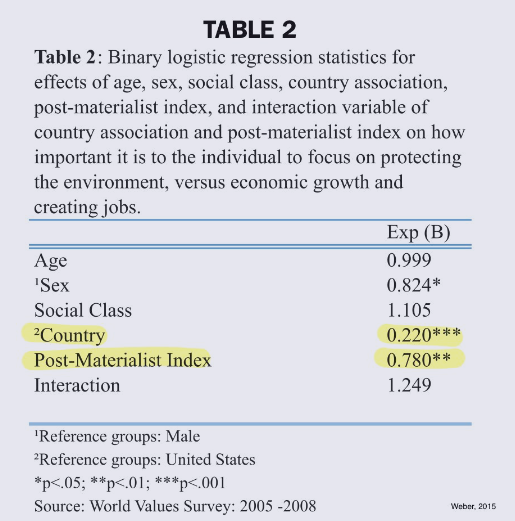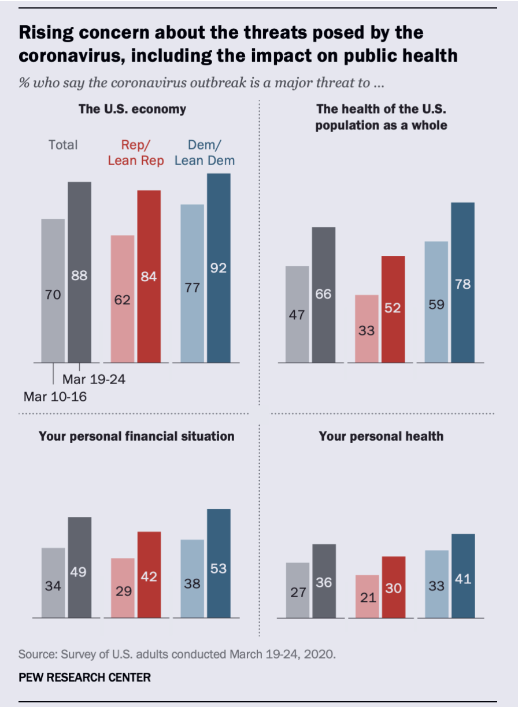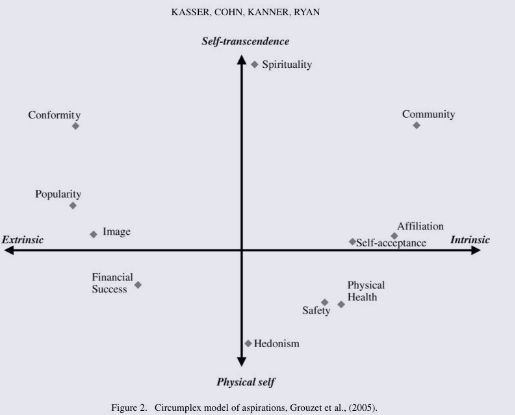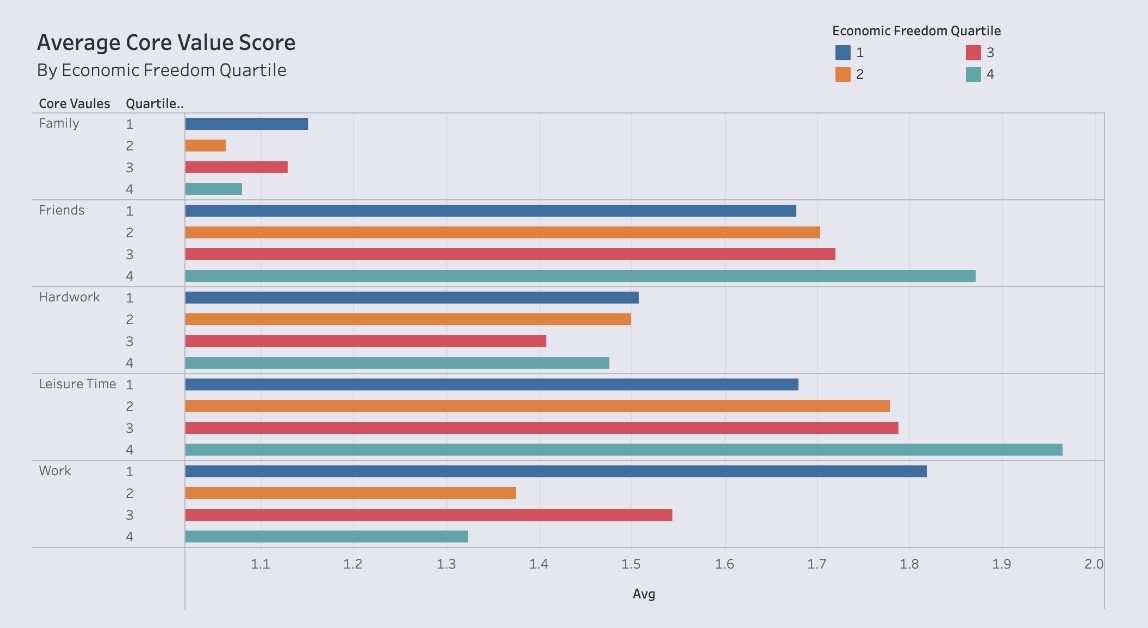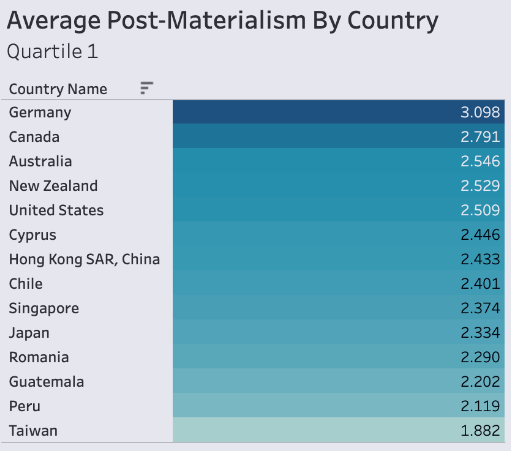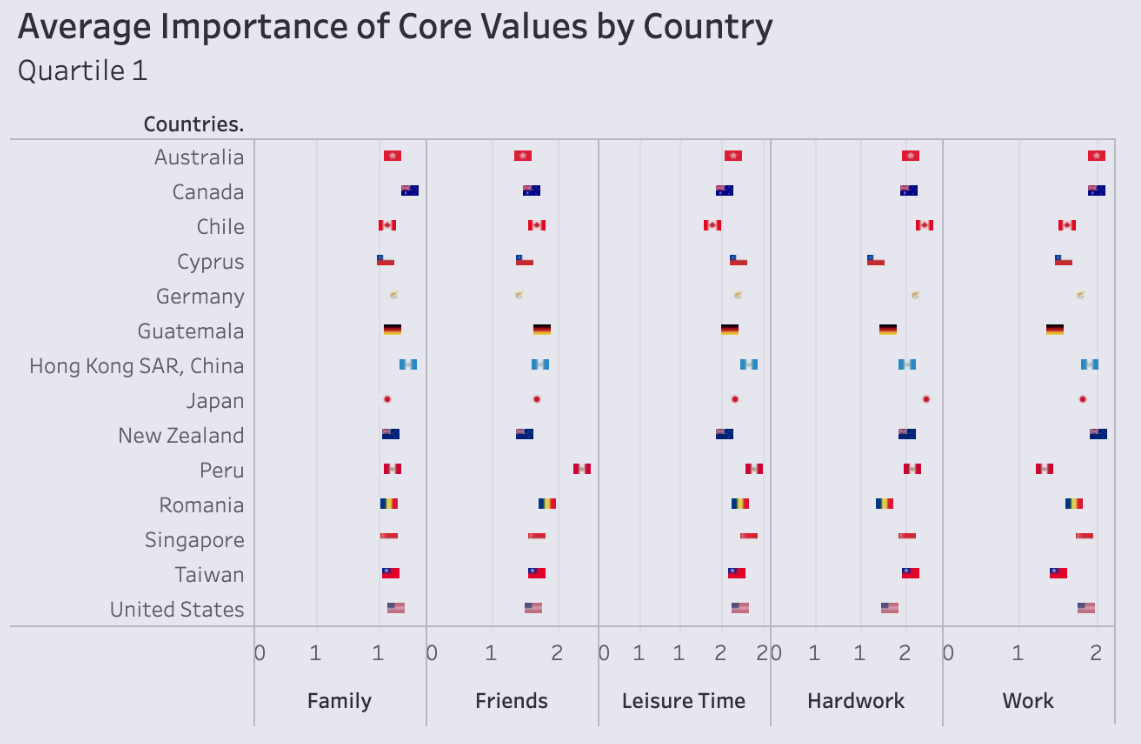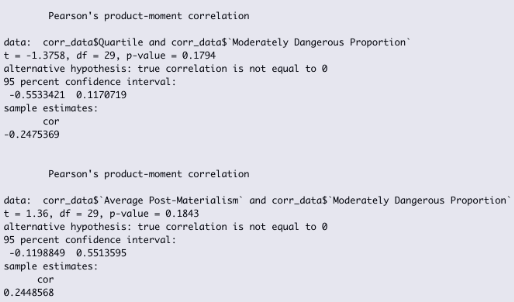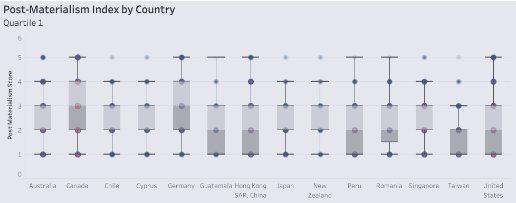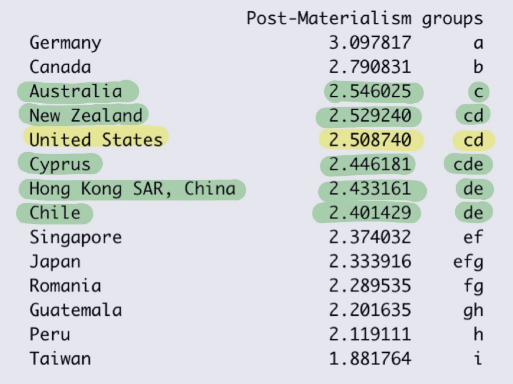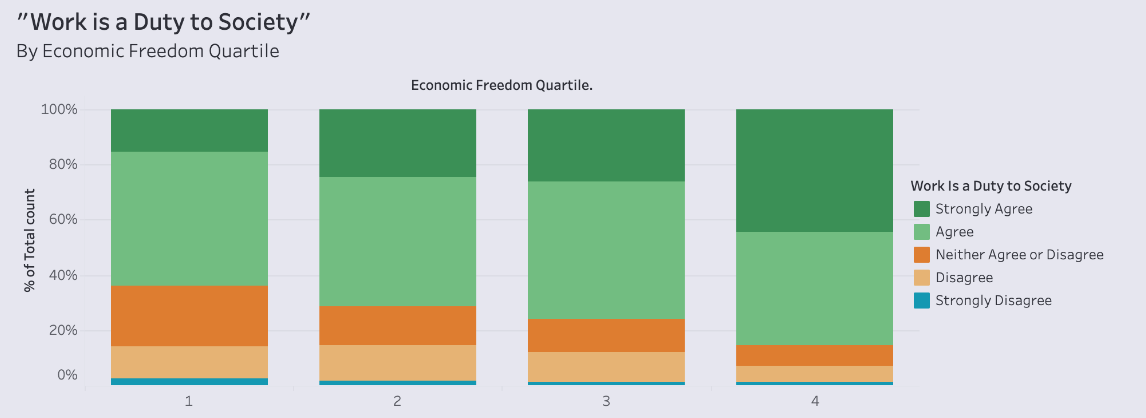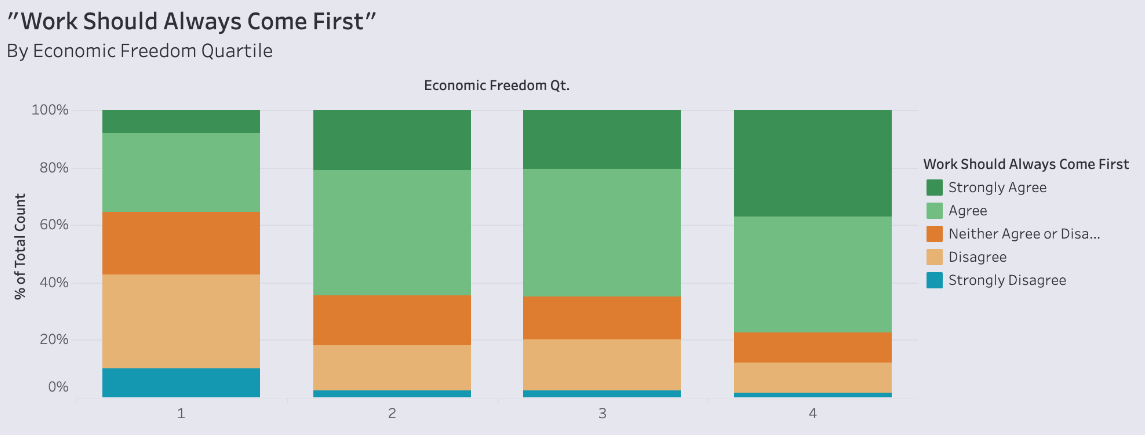
An Analysis of Its Implications from COVID19 data
Economic Systems and Post-Materialism
Introduction
As Americans begin to accept a “new normal” in the face of what’s now a two-year pandemic, some Americans wonder if initial greater concern for the virus may have prevented its extended stay. Pew Research questioned Americans’ opinions about COVID19 in its American Trend Wave Panel, published March 26, 2020, that may shed light on the matter.
In this study, Pew Research sought to compare the rise of concern in the COVID19 pandemic between March 10-16th to March 19-24th. By March 24, 2020, the daily deaths toll was on the rise with 2,203 deaths per day.
In one of Pew Research’s visualizations of the rising concern, the results show an increase in the percentage of Americans concerned about all of the topics asked: The U.S. economy, the Health of the U.S. population as a whole, (the participants’) Personal Financial Situation, and (the participants’) personal health.
However, despite the rise in concern between March 16th and March 24th, The U.S. Economy was still the top concern of Americans’ amongst the COVID-19 pandemic. By March 24, 2020, 88% of Americans were concerned for the threat posed to the economy, while only 66% were concerned for the threat posed to the health of the population as a whole. The question begs:
Why are more Americans concerned about the threat to the economy than the health of others during a pandemic?
Concerns are often a reflection of one’s values, for example, a person that values getting good grades will be concerned if they're not doing well in a class. Psychological literature recognizes the importance of values, defining them as beliefs used to characterize individuals or groups of people to trace change over time, and explain attitude and behavior (Schwartz, 2012).
Following Inglehart’s theory of Post-Materialism, Burroughs and Rindfleisch (2002) sought to identify where Materialism fits within Schwartz’ Theory of Values. As hypothesized, Materialism is negatively associated with aforementioned collective-oriented values; This result is visualized in their figure to the right, where Materialism sits on the opposite end from Universalism, Benevolence and Conformity. Additionally, Materialism is negatively associated with specific values such as community, family and religious values.
So then what do we know about Materialism and Post-Materialism, and why does it matter?
Fournier and Richins (1991) identify two types of Materialism: instrumental and terminal. Instrumental materialism is regarded as the good form of materialism, where goal attainment, general satisfaction or self-definition is enabled by the possession; however, Terminal materialism, or the bad materialism, occurs when consumption furthers no goal beyond possession itself. In most cases, references to Materialism focuses on terminal materialism, considering Fournier and Richins found that many don’t consider instrumental materialism at all. The authors note empirical evidence supports the notion that people who place more emphasis on material possessions are less happy than others and their attention is displaced from people to things, losing interpersonal rewards and relationships. One study highlighting this evidence finds that with one unit increase in post-materialism, participants are 22% less likely to value economic growth and creating jobs over protecting the environment (Weber, 2015); this suggests that for every one unit increase in Materialism, participants are 22% more likely to value economic growth and creating jobs over protecting the environment. This association between Materialism and valuing economic growth may be able to account for more Americans being concerned about the threat posed to the economy, than the health of other Americans.
Therefore, it’s worth exploring: What promotes Materialistic values?
Inglehart & Abramson (1994) argue that value priorities in advanced industrial society will tend to shift away from materialist to post materialist values; consequently, economic and physical insecurity will tend to increase the proportion of materialists. Materialism isn’t the only value that’s associated with the economy, in fact, when exploring the influence of economics and political ideology on psychology, Rigel (1972) found two main traditions labeled as capitalistic, dominant in the Anglo-American world, and mercantilistic-socialistic, prevailing in continental Europe. The findings show that while the Anglo American tradition tends to measure individuals against the same standards, continental Europe promotes a diversity of standards.
Krasser recognized that both Power and Achievement reflects that self-interested and financially acquisitive behaviors characteristic of ACC’s central tenets. This sparked the question: What values and goals are in opposition to those central in ACC? They found that universalism, benevolence, and self-direction oppose ACC’s aims of power and achievement; similar to Burroughs and Rindfleish’s (2002) results for Materialism. Shown in the figure to the right, financial success goals oppose those for community feeling, affiliation, and self-acceptance.
Therefore, concern for wealth and possessions conflicts with working “to improve the world through activism or generativity”. This research may suggest that materialism in the United States is significantly different from other countries, including those also under a capitalist system. In similar research, Krasser & Ryan (1993) claim that aspiring to the traditional American Dream was inversely related to self-actualization. However, Carver and Baird (1998) challenged this claim in their study that found having the right reasons for an aspiration would relate to greater self-actualization and the wrong reasons would relate to lower self-actualization, showing that the reasoning behind an aspiration is more important than the aspiration itself. Similarly, my research aims to evaluate the values under particular economic systems that influence action, rather than actions themselves.
Accordingly, the question and hypotheses for the current study are as follows:
Research Question: In the initial stages of the COVID-19 Pandemic, why were more Americans concerned about the threat posed to the economy, than the health of other Americans?
Hypothesis #1: The economy under which an individual lives is associated with their materialist - postmaterialist values.
Hypothesis #2: The American economy specifically is associated with significantly different average materialism than other countries that possess similar economies.
Hypothesis #3: Materialist - Postmaterialist values are associated with how dangerous individuals perceive COVID-19
Data Collection and Methods:
Measures
Study 1
Hypothesis: The economy under which an individual lives is associated with their materialist - postmaterialist values.
Relating back to the “Average Post-Materialism by Country” table, we can see how more evenly distributed countries such as Germany and Canada have the highest average Post-Materialism scores (first and second highest average respectively). To test if these differences are significant, an ANCOVA was conducted comparing the average Post-Materialism score of each Economic Freedom Quartile, while controlling for Social Class.
Results
Now that sufficient evidence has been found of the influence of Economic Freedom on Post-Materialistic values, to address the research question the MIT’s Global survey on COVID-19 beliefs, behaviors, and norms was used. To measure the concerns of COVID-19, the proportion of participants that answered “Moderately Dangerous” to the question “How dangerous do you think the COVID-19 risk is to your community?” was analyzed. This specific answer was measured due to participants being more likely to answer in the middle of a scale rather than the extremes (especially considering the controversiality of beliefs regarding COVID-19). Finally, the correlation between Economic Freedom Quartile, the average Post-Materialism score and the proportion of participants within each country that believed COVID-19 was moderately dangerous, was tested for statistical significance.
Results
The well-known Schwartz Value Theory identifies 10 broad values, including Benevolence, Conformity and Universalism; these three values serve as “collective oriented values” according to Schwartz. All 10 of Schwartz values fall within a circular structure which portrays the theory that actions in congruence with some values, have consequences that conflict with other values. In other words, this model allows us to identify the relationship between all of the values.
Therefore, the values Hedonism, Achievement, and Power would be “anti-collective oriented values” so to speak. Relating back to our question, it may be possible that the greater concern for the threat posed to the economy than the health of Americans, can be explained by common American values, and more specifically, values that oppose collective oriented values.
Why does this suggest a reflection of values in opposition to collective oriented values?
Firstly, the value that most accurately reflects a greater concern of the American Economy is the value defined as Post-Materialism. Developed in part by Ronald Inglehart, Post-Materialism is the shift from materialist values to non-materialist values (Inglehart, 1977). An example of this shift could be represented by an individual having more personal economic values (materialist values), then switching to having more collective-oriented values (post-materialist values). Similarly, Americans having greater concern for the threat posed to the economy compared to the health of Americans, can be understood as Americans being more likely to possess materialist values.
Referencing back to Weber (2015), an example of economic influence on post-materialism is shown in their study that investigated the differences in post-materialistic values, specifically environmental values, between developed and semi-developing countries. Using the World Values Survey Data, collected during the fifth wave from 2005 to 2009, 1002 participants from Argentina and 1710 participants from the U.S participated in this study; additionally, Argentina served as a semi-developing country, and the U.S. is a developed country. Weber found that participants in the U.S. are less likely to care about the environment compared to Argentina participants.
The economy can be so influential, that Krasser et al. (2007), argues that the aims and practices of American Corporate Capitalism (ACC) alone, often conflict with pursuits such as caring about the broader world and having close relationships with others. Schwartz (1992, 1996) found that two of his values conceptually overlap with the primary aims of ACC, across diverse countries: “Power” which involves dominance over people and resources, and “Achievement” which involves a focus on personal success demonstrated through socially accepted means.
Participants
To test the first and second hypothesis, data was collected from the World Values Survey’s Wave 7 questionnaire featuring data for 57 countries/territories, and more than 70,000 respondents. The World Values Survey (WVS) is an international research program devoted to the scientific and academic study of social, political, economic, religious and cultural values of people in the world. The 7th wave of the WVS took place worldwide in 2017-2021. The wave was officially closed on December 31, 2021, with a few surveys being delayed due to the corona-pandemic and still remaining in the first quarter of 2022. The participants’ age range from 15 - 90 years of age, with the majority being of lower-middle/working class, making up a racially diverse population from around the world.
In addition to this questionnaire, data from the Fraser Institute. The Fraser Institute produces research about government actions in areas that deeply affect Canadians’ quality of life such as taxation, health care, aboriginal issues, education, economic freedom, energy, natural resources and the environment. However, in the current research, we focus solely on The Fraser Institute’s Economic Freedom worldwide economic data containing information on 165 countries. Data from the WVS and the Fraser Institute were merged in R to evaluate the relationship between values and economy.
The last hypothesis uses data from MIT’s Global survey on COVID19 beliefs, behaviors, and norms. From July 2020 to March 2021, MIT fielded a global survey on COVID19 beliefs, behaviors, and norms in 67 countries yielding over 2.0 million responses. In the current research, only 46 countries are represented due to the limited data from the World Values Survey. Data from the WVS, the Fraser Institute, and MIT were merged to evaluate the relationship between values, economy, and COVID-19 beliefs.
To measure Post Materialism, the WVS used Inglehart’s 12-item Post-Materialism Index. Post-Materialism is evaluated on a scale where 1 = Materialist and 5 = Post-Materialist. To determine differences between economies, Post-Materialism among participants were aggregated on a country level. Each average Post-Materialism score was then divided into categories by economy. To measure Economy the Economic Freedom of each country was ranked as determined by the Fraser Institute. Countries are then placed into one of four Quartiles. Quartile 1 represents the most economically free countries, while Quartile 4 represents the least economically free countries. Therefore, a country’s average Post-Materialism score was placed into the country’s respective Quartile, and then compared to average Post-Materialism of countries within other Quartiles. Finally, to control for the effects of Inglehart’s Theory stating economic and physical insecurity will tend to increase the proportion of materialists, Social Class is considered as a covariate. Social Class is measured subjectively with 1 = Upper Class and 5 = Lower Class.
Exploratory Data Analysis
Upon initial exploration of the data, the average Post-Materialism score (the mean column in the table to the above) seems to decrease, as the Economic Freedom Quartile increases. That is, the less economically free countries are, the higher the Post-Materialism score is on average.
What are these participants' general values?
Starting with what the WVS defines as Core Values, the average importance of family, friends, hard work, leisure time and work, were aggregated by Economic Freedom Quartile. Importance was measured on a scale from 1 = very important to 4 = not at all important.
The general trend shows that above all other values, Family is the most important regardless of Economic Freedom Quartile. However, there are stark differences in the way Work and Leisure Time is perceived in importance; Almost showing an inverse relationship between Work and Leisure Time, as Economic Freedom decreases the average importance of leisure time decreases, and as Economic Freedom decreases the average importance of Work increases. Despite these trends, Hard Work remains relatively stable in its average importance across Economic Freedom Quartiles. From this visualization we can already start to see how values are shaped and prioritized within each Quartile.
Post-Materialism Distribution
Grouped by Quartile, shown to the right is the distribution of average Post-Materialism Scores. From initial analysis, we can see a range of all possible scores, with Quartile 1 possesing a larger percentage of scores that lean towards Materialism.
Despite this distributed lean towards Materialism, when evaluating the average score of each Economic Freedom Quartile, we can see that (in the table below) Quartile 1 possesses the highest average score of 2.5052.
Results
Similar to the initial exploration of the data in Study #1, in the initial exploration of the participants in Study 2, the descriptive statistics of these participants were evaluated. The participants in this study are a subsection of the previous participants, representing only the countries and individuals within Quartile 1.
Participants in Quartile 1 were chosen to allow for the comparison of individuals within the United States, against individuals in other countries with similar economies. Therefore, since all countries in Quartile 1 have similar Economic Freedom, only countries in Quartile 1 were used for comparison. In the table above, we can see all 14 countries included in Quartile 1, which contains Germany, Canada, Australia, New Zealand, the United States, Cyprus, Hong Kong, Chile, Singapore, Japan, Romania, Guatemala, Peru and Taiwan.
Quartile 1 has the highest number of participants, while Quartile 3 has the lowest. Consequently, we can see in the table to the left that Quartile 1 includes 14 countries, while Quartile 3 has 9 countries.
Additionally, as Economic Freedom decreases, the average Post-Materialism score also decreases. This suggests that participants in countries with less Economic Freedom, tend to have more Materialist Values compared to participants in countries with more Economic Freedom. To confirm this trend, an ANCOVA was conducted comparing the average Post-Materialism score of each Economic Freedom Quartile, while controlling for Social Class.
.
The findings show that even when controlling for Social Class, there is statistically significant evidence that Economic Freedom is associated with Post-Materialist Values. As represented in the Value column in the table above, for every decrease in Economic Freedom Quartile there is an associated decrease in Post-Materialism (p < .05). These results support the first hypothesis: The economy under which an individual lives is associated with their materialist - postmaterialist values.
.
Study 2
Hypothesis: The American economy specifically is associated with significantly different average materialism than other countries that possess similar economies.
Exploratory Data Analysis
The table shows that the United States has the fifth highest average Post-Materialism score (represented by the mean column). The United States is also the most represented country in Quartile 1, with 2,174 participants being considered in the average Post-Materialism score.
Quartile 1 - Participants’ Core Values
Comparing core values once again, this time by Country in Quartile 1, we can see once again that Family consistently remains to be the most important value regardless of Country.
Study 3
Hypothesis #3: Materialist - Postmaterialist values are associated with how dangerous individuals perceive COVID-19
Variation by country occurs in reference to Friends, Leisure Time, Hard Work and Work. Unlike the comparison of Quartiles, there does not seem to be as strong of an inverse relationship between Leisure Time and Work. The United States in particular finds Leisure Time almost as important as Work on average.
Post-Materialism Distribution
Grouped by Country, shown to below is the distribution of average Post-Materialism Scores. The skew of scores vary from country to country; for example, Taiwan’s scores significantly lean toward Materialist scores, while Germany and Canada have a more even distribution of Materialist and Post-Materialist scores.
The findings show that even when controlling for Social Class, there is statistically significant evidence that Country is associated with Post-Materialist values (F=84.40, p = .000).
Results
Now, using this ANCOVA model, we can determine whether the average Post-Materialism values within the United States is statistically different from other countries within the first Economic Freedom Quartile.
Hypothesis #2 states: The American economy specifically is associated with significantly different average materialism than other countries that possess similar economies. However, the results below show the United States’ Post-Materialist values were not significantly different from Australia, New Zealand, Cyprus, Hong Kong, or Chile. Therefore, these results do not support the second hypothesis.
The correlation between Economic Freedom Quartile and the belief that COVID19 was moderately dangerous was -.25, meaning as Economic Freedom within a country decreases, the proportion of participants within each country that believes COVID-19 is moderately dangerous dreceases as well (keeping in mind that Quartile 1 has higher economic freedom than Quartile 4).
Exploratory Data Analysis
A correlation of .24 occurred for Post-Materialism, showing that as the Post-Materialism score increases, the proportion of participants within each country that believes COVID-19 is moderately dangerous increases as well. Despite these relationships, the findings show that neither Economic Freedom Quartile, nor Post-Materialism was significantly associated with beliefs that COVID19 was moderately dangerous.
Study 3.1
Additional hypotheses were tested out of interest, prompted by insights uncovered during the course of the initial study:
Two of the questions asked within the WVS questionnaire asked about values in regards to work. These questions asked:
1) “Do you agree or disagree with the following statement? – Work is a duty towards society”
2) “Do you agree or disagree with the following statement? – Work should always come first, even if it means less spare time”.
The responses to these two questions are visualized in “Work is a Duty to Society” and in “Work Should Always Come First” (both shown below).
As shown above, as Economic Freedom decreases, the tendency to strongly agree or agree that work is a duty to Society, increases. This relationship seems to become stronger when asked if work should always come first (shown below).
Considering the implications of COVID19 being dangerous, such as the impact of COVID19 on ability to go to work, and providing income for loved ones, it was of interest to test the relationship between perceiving work as a duty to society/believing work should always come first and believing COVID19 is moderately dangerous.
Additionally, because work compensates individuals for their time with money, the concern for work can be influenced by a concern for wealth and possessions; A Materialist pursuit. This same concern may also be had of those belonging to lower a Social Class, that is, wealthy individuals are not concerned with becoming wealthy. Therefore, the relationship between Social Class and believing COVID19 is moderately dangerous was also tested. Averages of Work Duty, Work Priority, and Social Class were aggregated by Country.
Hypotheses
Hypothesis 3.1: Believing work is a duty to society is associated with believing COVID19 is moderately dangerous
Hypothesis 3.2: Believing work should always come first is associated with believing COVID19 is moderately dangerous
Hypothesis 3.2: Social Class is associated with believing COVID19 is moderately dangerous
The findings show that there is a statistically significant relationship between perceiving work as a duty to society and believing COVID19 is moderately dangerous (t = 3.27, p = 0.002), between believing work should always come first and believing COVID19 is moderately dangerous (t = 2.76, p-value = 0.009), and between Social Class and believing COVID19 is moderately dangerous (t = -2.11, p-value = 0.044).
To contextualize these findings:
The more a country disagrees that work is a priority on average, the more likely the country is to believe COVID19 is moderately dangerous.
The more a country disagrees that work is a duty to society on average, the more likely the country is to believe COVID19 is moderately dangerous.
The lower the average Social Class of a country, the less likely the country is to believe COVID19 is moderately dangerous.
Discussion
Prior research indicates that values are a key factor in the beliefs, attitudes, and concerns an individual possesses. Given that a larger proportion of Americans were concerned about the economy than the health of Americans at the beginning of the COVID19 pandemic, it is crucial to understand when the values within a community either further promotes that community, or conflicts with the community. Despite greater concern of the economy, the current studies show that Americans actually hold relatively high Post-Materialist values compared to other countries across all Quartiles (Study 1), and countries within Quartile 1 (Study 2). Considering that the United States lies within the most economically free quartile, Study 1’s finding, “for every decrease in Economic Freedom Quartile there is an associated decrease in Post-Materialism”, is consistent with Inglehart’s theory that economic security contributes to the rise of postmaterialist values (Inglehart, 1994). However, on average, the Post-Materialism score of Americans is a 2.51; this score still lies on the lower half of the Post-Materialism scale, suggesting a tendency for Americans to be more Materialistic than Post-Materialistic as supported by Krasser et al. (2007).
Study 2’s findings highlights Krasser et al. (2007) concern that, “some of the psychological dynamics and costs that [they had identified] as occurring in ACC may also occur under economic systems… [and] some of the issues [they highlighted] may not be unique to ACC.” The United States economic system’s effect on Post-Materialism in Americans, may not be different from other economies’ effect on individuals within those economies because the issues/psychological costs of ACC may be applicable to those economies. Future research is needed to adequately address this problem.
Still, Economic Freedom and Post-Materialism could not significantly explain the values and beliefs regarding COVID19. One reason this may be can be found in Carver & Baird (1998) findings, that highlight the importance of intrinsic-identified and extrinsic-introjected reasoning for an aspiration and concludes that wanting financial success, does not inherently influence an individual to not have concerns for their community. Despite these findings, there were significant relationships regarding work values, social class and perceived COVID19 danger. These findings are interesting considering the significant relationship between Post-Materialism and Social Class, as well as Social Class and Perceived COVID19 danger. Study 3’s findings may highlight how economics at a more micro level, may play a role in Post-Materialism and its effect on how individuals value their communities. For example, these findings may show how a person’s greater concern for going to work and earning income overshadowed how dangerous COVID19 really was; similarly, those more concerned about working tend to be of lower social class, explaining why countries with higher proportions of lower class individuals, have lower proportions of individuals perceiving COVID19 as dangerous (as we see in Pew Research’s data). Of course, further research is required to test these speculations.
Limitations
Some of the current research’s limitations include the restraints presented by the data collected. The WVS data was collected on an individual level, while the Economic Freedom data and COVID19 values data had to be collected by country. This required aggregating WVS data to averages, limiting our conclusions to a country level, then the individual level. Were more time permitted, an official request to MIT for microdata on COVID19 values would have been sent; perhaps future research will include these microdata that contains COVID19 values on an individual level. Economy was a difficult variable to measure. In the design of the studies, dividing countries by “Capitalist”, “Socialist”, etc. was considered to be able to compare countries by economic system. However, there are many conflicting views of which countries are considered which, especially considering that many countries’ economic systems are considered a mix of several economic systems. Therefore, a concrete scale of Economic Freedom was used by the Fraser Institute. Future studies may consider a different approach to measuring Economy, and evaluating the psychological costs between them. Lastly, Inglehart’s Postmaterialism Scale has been under debate in previous literature. Braithwaite et al. (1996), for example, challenges the “forced choice’ methodology of the measurement of Postmaterialism in Inglehart’s scale, that requires participants to prioritize materialist values and post-materialist values over one another. This study argues that in reality, individuals do not have to choose between these two types of values, and many people prioritize both at the same time.
Citations
Braithwaite, V., Makkai, T., & Pittelkow, Y. (1996). Inglehart's Materialism‐Postmaterialism Concept: Clarifying the Dimensionality Debate Through Rokeach's Model of Social Values 1. Journal of Applied Social Psychology, 26(17), 1536-1555.
Burroughs, J. E., & Rindfleisch, A. (2002). Materialism and well-being: A conflicting values perspective. Journal of Consumer research, 29(3), 348-370.
Carver, C. S., & Baird, E. (1998). The American dream revisited: Is it what you want or why you want it that matters?. Psychological science, 9(4), 289-292.
Ger, G., & Belk, R. W. (1996). Cross-cultural differences in materialism. Journal of economic psychology, 17(1), 55-77.
Inglehart, R., & Abramson, P. R. (1994). Economic security and value change. American political science review, 88(2), 336-354.
Kasser, T., Cohn, S., Kanner, A. D., & Ryan, R. M. (2007). Some costs of American corporate capitalism: A psychological exploration of value and goal conflicts. Psychological Inquiry, 18(1), 1-22.
Richins, M., & Fournier, S. (1991). Some theoretical and popular notions concerning materialism. Journal of Social Behavior and Personality, 6(6), 403-414.
Riegel, K. F. (1972). Influence of economic and political ideologies on the development of developmental psychology. Psychological Bulletin, 78(2), 129.
Schwartz, S. H. (2012). An overview of the Schwartz theory of basic values. Online readings in Psychology and Culture, 2(1), 2307-0919.
Weber, R. J. (2015). Post-materialism and environmental values in developed vs. semi-developing countries: analysis of Argentina and United States using the world values survey.
